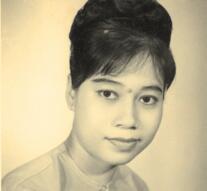
Dr. Daw was a woman with great talent, courage, dignity, compassion, and generosity, remembers her family.
She attended public schools in Burma, a former British Commonwealth country. She excelled in school and had a profound interest in medicine. When she chose that career, she was not a bit fazed to enter a predominantly male profession. That was in the early 1960s. After receiving her doctorate degree in medicine, she married and started a family in California. She also set up a medical clinic in an underserved community.
Dr. Daw selflessly gave her services and resources to the poor and to people of religious institutions regardless of their faith. At the mission nearby, she was the only female physician to care for any medical needs.
One evening in 2002, on the eve of her 59th birthday, Dr. Daw’s daughters received word that their mother was critically ill. She’d had multiple brain aneurysm ruptures. The bleeding had done such extensive damage that she was no longer responsive to any of the tests.
“Everything came crashing down,” remembers Dr. Daw’s daughters. “Then an advocate from OneLegacy talked to us about organ donation. The idea of having a chance to save someone else’s life appealed to us—even though we didn’t want to take mom off life support.”
“We asked ourselves what she would have wished. We consented to the donation of some of her organs. We wanted someone’s father, husband, wife, mother, daughter, or son to have more time to spend with their loved ones.”
Her family said their final good-byes. “It was very painful to let her go,” they recall. “But someone got a chance to live because of mom. As a physician, she had cared for so many people. This last gift she made is an everlasting testament to her character.”